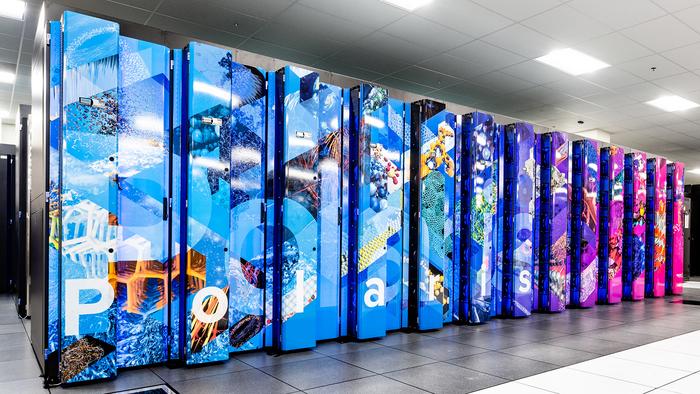In a new paper in Science Advances on May 29, researchers at JPMorgan Chase, the U.S. Department of Energy’s (DOE) Argonne National Laboratory and Quantinuum have demonstrated clear evidence of a quantum algorithmic speedup for the quantum approximate optimization algorithm (QAOA).

Credit: (Image by Argonne National Laboratory.)
In a new paper in Science Advances on May 29, researchers at JPMorgan Chase, the U.S. Department of Energy’s (DOE) Argonne National Laboratory and Quantinuum have demonstrated clear evidence of a quantum algorithmic speedup for the quantum approximate optimization algorithm (QAOA).
This algorithm has been studied extensively and has been implemented on many quantum computers. It has potential application in fields such as logistics, telecommunications, financial modeling and materials science.
“This work is a significant step towards reaching quantum advantage, laying the foundation for future impact in production,” said Marco Pistoia, head of Global Technology Applied Research at JPMorgan Chase.
The team examined whether a quantum algorithm with low implementation costs could provide a quantum speedup over the best-known classical methods. QAOA was applied to the Low Autocorrelation Binary Sequences problem, which has significance in understanding the behavior of physical systems, signal processing and cryptography. The study showed that if the algorithm was asked to tackle increasingly larger problems, the time it would take to solve them would grow at a slower rate than that of a classical solver.
To explore the quantum algorithm’s performance in an ideal noiseless setting, JPMorgan Chase and Argonne jointly developed a simulator to evaluate the algorithm’s performance at scale. It was built on the Polaris supercomputer, accessed through the Argonne Leadership Computing Facility (ALCF), a DOE Office of Science user facility. The ALCF is supported by DOE’s Advanced Scientific Computing Research program.
“The large-scale quantum circuit simulations efficiently utilized the DOE petascale supercomputer Polaris located at the ALCF. These results show how high performance computing can complement and advance the field of quantum information science,” said Yuri Alexeev, a computational scientist at Argonne. Jeffrey Larson, a computational mathematician in Argonne’s Mathematics and Computer Science Division, also contributed to this research.
To take the first step toward practical realization of the speedup in the algorithm, the researchers demonstrated a small-scale implementation on Quantinuum’s System Model H1 and H2 trapped-ion quantum computers. Using algorithm-specific error detection, the team reduced the impact of errors on algorithmic performance by up to 65%.
“Our long-standing partnership with JPMorgan Chase led to this meaningful and noteworthy three-way research experiment that also brought in Argonne. The results could not have been achieved without the unprecedented and world leading quality of our H-Series Quantum Computer, which provides a flexible device for executing error-correcting and error-detecting experiments on top of gate fidelities that are years ahead of other quantum computers,” said Ilyas Khan, founder and chief product officer of Quantinuum.
Read the full research paper here:
About JPMorgan Chase
JPMorgan Chase & Co. (NYSE: JPM) is a leading financial services firm based in the United States of America (“U.S.”), with operations worldwide. JPMorgan Chase had $4.1 trillion in assets and $337 billion in stockholders’ equity as of March 31, 2024. With over 63,000 technologists globally and an annual tech spend of $15 billion, JPMorgan Chase is dedicated to improving the design, analytics, development, coding, testing and application programming that goes into creating high quality software and new products. Under the J.P. Morgan and Chase brands, the Firm serves millions of customers in the U.S., and many of the world’s most prominent corporate, institutional and government clients globally. Visit for more information
About Quantinuum
Quantinuum, the world’s largest integrated quantum company, pioneers powerful quantum computers and advanced software solutions. Quantinuum’s technology drives breakthroughs in materials discovery, cybersecurity, and next-gen quantum AI. With almost 500 employees, including 370+ scientists and engineers, Quantinuum leads the quantum computing revolution across continents. Quantinuum recently closed an equity fundraise anchored by JPMorgan Chase with additional participation from Mitsui & CO., Amgen and Honeywell, which remains the company’s majority shareholder, bringing the total capital raised by Quantinuum since inception to approximately $625 million.
The Honeywell trademark is used under license from Honeywell International Inc. Honeywell makes no representations or warranties with respect to this service.
Journal
Science Advances
Article Title
Evidence of scaling advantage for the quantum approximate optimization algorithm on a classically intractable problem
Article Publication Date
29-May-2024



